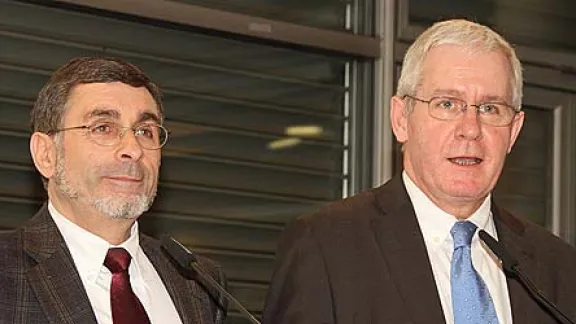
Rev. Laurent Schlumberger (right), president of the United Protestant Church of France, and Rev. Joël Dautheville (left), who until the merger with the Reformed, led the Evangelical Lutheran Church of France. © EPUDF-DC
Junge Welcomes the Sharing of Gifts with the Lutheran Communion
The Lutheran World Federation (LWF) General Secretary Rev. Martin Junge has expressed gratitude to the leadership of the United Protestant Church of France for emphasizing the witnessing dimension of the church in the unification process between the Lutheran and Reformed churches in France.
Junge participated in the 11 May inauguration of the United Protestant Church of France (EPUdF)—a union of the Evangelical Lutheran Church of France and the Reformed Church of France—celebrated in Lyon. It was the culmination of a process that began in 2007. Both churches trace their history to the 16th century Reformation movement.
In his letter to the newly elected EPUdF president Rev. Laurent Schlumberger, the LWF general secretary said “the joyful day marked in a powerful way the opening of a new chapter in the life of Protestantism in France, which sees a church that is ready to go out, following Christ’s path of incarnation, and thus reaching human beings in their specific life settings within the context of France.”
He continued, “Your process captured in a beautiful way that relationships of koinonia do not have their end in themselves, but have their horizon in the churches’ participation in God’s mission.”
Hundreds of people from France and international guests attended the inauguration ceremony, which included the installation of the 20-member EPUdF governing council headed by Schlumberger, former president of the Reformed Church of France. Lutheran pastor Jean-Frédéric Paztrynski and Ms Patricia Hildebrand will serve on the council as vice-presidents.
Addressing the inauguration ceremony, Schlumberger described the formation of the united church as a response to “immense changes” in the religious landscape of France and the result of the ecumenical movement’s visible unity between churches.
He mentioned the 1973 Leuenberg Agreement between Lutherans and Reformed churches in Europe, as an accord that had provided a model of unity that was no longer based on uniformity and suspicion but rather on “reconciled diversity.”
Schlumberger said the great challenge facing the church today was to be faithful to the gospel and to share it. For Protestants in France, this requires a shift “from being a closed group to meeting others, from being a church walled around to a church with open doors, from being a church made up of members to a church made up of witnesses.” The EPUdF, he added, “is not an end in itself, but exists to be renewed for mission and service.”
Junge encouraged the EPUdF to share the specific experience of its merger process with churches in the Lutheran communion, and to be enriched by the gifts that other churches have developed as they witness to the Gospel of Jesus Christ. “In the context of a communion of churches, the giving and the receiving doesn’t know of borderlines that would cluster churches according to their capacity to give or their need to receive,” he added.
There are an estimated 1.5 million Protestants in France, representing around three percent of the country’s population. The EPUdF has 400,000 members in ten regions, served by about 450 pastors. The Lutheran church was one of the founding member churches of the LWF in 1947, and was until the merger, led by Rev. Joël Dautheville as president.


